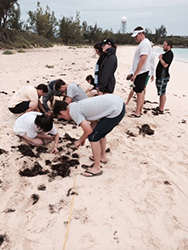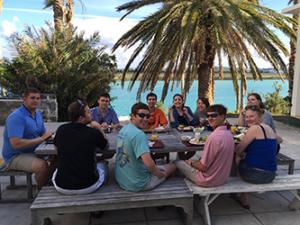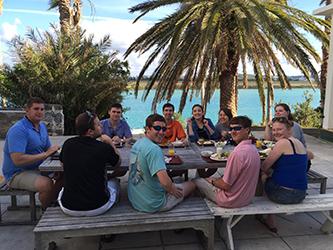IIANC Professor of Insurance David Marlett led a study abroad trip to Bermuda May 12-19. Walker College Employer Relations Coordinator Emily Marlett served as the trip co-leader for the delegation, and the two led ten business students to Bermuda as part of the International Insurance Markets course.
The students participated in sustainability projects as part of the trip, in addition to learning about reinsurance markets, risk models and the regulatory system.
The group visited the Bermuda Institute of Ocean Sciences (BIOS) and learned how changing ocean and weather conditions impact severe weather events. The group also met with reinsurers who analyze the changing climate conditions to predict future losses.
"Insurers and governmental insurance programs purchase reinsurance to help finance claim payments after a disaster," explained Marlett. "These payments allow property owners to rebuild and the community to recover."
While in Bermuda, the students participated in two BIOS projects, the first focused on forest restoration on Coopers Island. Marlett detailed the experience:
Coopers Island is an abandoned former US military base that is undeveloped. We helped with culling of invasive species (non-natives that have negative impacts on the economy and environment). This included the Australian whistling pine, Brazilian Pepper, and the Jumbie bean (wild mimosa). Once removal was complete then we planted endemic (unique to a defined geographic location not found anywhere else) Cedar Trees. The trees location are documented and recorded using GPS coordinates. We were asked to name two trees and chose the Appalachian State mascot "Yosef" and "Crosby" honoring Dennis Crosby who helped make the trip possible. The University will receive updates on the growth of the trees, and we now have a lasting connection to the Bermudian environment.
 The second BIOS project in which the students participated concerned plastic debris transect on high tide mark.
The second BIOS project in which the students participated concerned plastic debris transect on high tide mark.
Bermuda being located in the middle of the North Atlantic Gyre (made up of Gulf Stream, North Atlantic current, Canary current, North Equatorial current, and the Labrador current) makes it a perfect catchment for floating plastic debris in the oceans (BIOS faculty have been seeing this in the last 20 years). A majority of debris they find include, gill nets (green net that is illegal almost worldwide), shot gun shells (no guns in Bermuda), glow sticks (from fisherman that look like squid carapace and gobbled up by seabirds), lobster pot tags (saying dept of environmental protection), plastic water pouches (from aid relief), and big pieces of plastic debris with numerous bite marks from fish and turtles. Our students worked with a BIOS Program Assistant by setting up a transect laid on the high tide mark. We collected all the debris found within the area, and bagged and weighed it in order to access the amount of debris that we are finding on our local beaches.
The group was hosted by Dr. Mark Guishard of the Risk Prediction Initiative who presented on catastrophic risk modeling and discussed the potential impact of a changing climate. View trip photos online.
The Walker College of Business is committed to advancing sustainable business practices that promote responsible management of economic, social and natural resources. Read the full Walker College of Business mission statement.
The remainder of the week was spent in Hamilton visiting reinsurers, brokers and regulators. Learn more about the trip objectives and results relating to the RMI curriculum.

